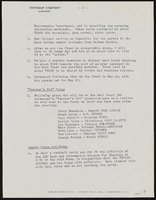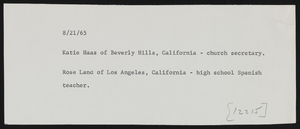Search the Special Collections and Archives Portal
Search Results
Harvey Munford oral history interview
Identifier
Abstract
Oral history interview with Harvey Munford conducted by Claytee D. White on August 21, 2015 for the African Americans in Las Vegas: a Collaborative Oral History Project. Munford begins by discussing his career as a Nevada State Assemblyman and the Nevada legislative process. He then describes his early history, detailing his college education and athletic career as a basketball player for the University of Akron and later at Montana State University Billings. Munford also describes the discrimination he faced as an African American throughout his life particularly during the 1960s and 1970s, arriving in Las Vegas, Nevada in 1966, and his thirty-eight year career as a teacher in the Clark County School District.
Archival Collection
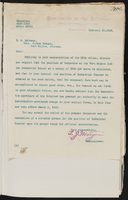
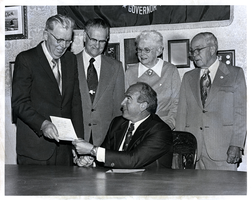
Photograph of Elbert Edwards and others with an accompanying letter, April 24, 1975
Date
Archival Collection
Description
Image
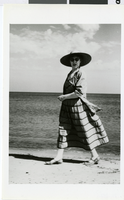
Photograph of Ann E. Brewington, 1920s-1930s
Date
Archival Collection
Description
Image
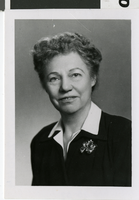
Photograph of Ann E. Brewington, 1954
Date
Archival Collection
Description
Image
Clarence Gilyard oral history interview
Identifier
Abstract
Oral history interview with Clarence Gilyard conducted by Barbara Paige on December 02, 2014 for the African Americans in Las Vegas: a Collaborative Oral History Project. Gilyard begins the interview by discussing his upbringing on United States Air Force bases, his father's career as an Airman, and the advantages he had attending Air Force schools as a child as opposed to attending public schools, where he may have faced discrimination as an African American. He describes his higher education, playing college football, and later pursuing a career in acting after becoming involved in local theatre while attending college at California State University, Long Beach. Gilyard continues, detailing how he gained more acting work and eventually acted alongside actors like Jim Carrey, Andy Griffith, and Chuck Norris, as well as starred in film and television series such as Top Gun, Die Hard, Matlock, and Walker, Texas Ranger. He concludes by discussing his career as an acting teacher and continuing his own education.
Archival Collection

Transcript of interview with Judy Laliberte by LaVaun Hendrix, February 27, 1979
Date
Archival Collection
Description
On February 27, 1979, collector Judy Laliberte interviewed local school teacher LaVaun Hendrix in her home in Las Vegas, Nevada. The two discuss how Hendrix originally came to Nevada, her occupational history, and differences between the school system in Las Vegas and other states that she’s lived in. Hendrix explains how a changing school system has affected her job as a teacher and her students. She goes on to talk about the above-ground atomic tests, Helldorado, changes to the desert, and Nevada during World War II. The interview concludes with Hendrix describing her travels through Nevada.
Text
Lydia Berry oral history interview
Identifier
Abstract
Oral history interview with Lydia Berry conducted by Kathy Zeller on February 22, 1979 for the Ralph Roske Oral History Project on Early Las Vegas. During this interview Berry discusses her experiences as a worker for the United States Fish and Wildlife Service. Berry discusses her progression from being a teacher in Kansas City, Missouri to moving to Los Angeles, California and then to Las Vegas, Nevada where she worked at Nellis Air Force Base and then eventually to the Fish and Wildlife Service. She also mentions some of the operations of the Wildlife Service as well as her concerns over animal life and natural resources.
Archival Collection

